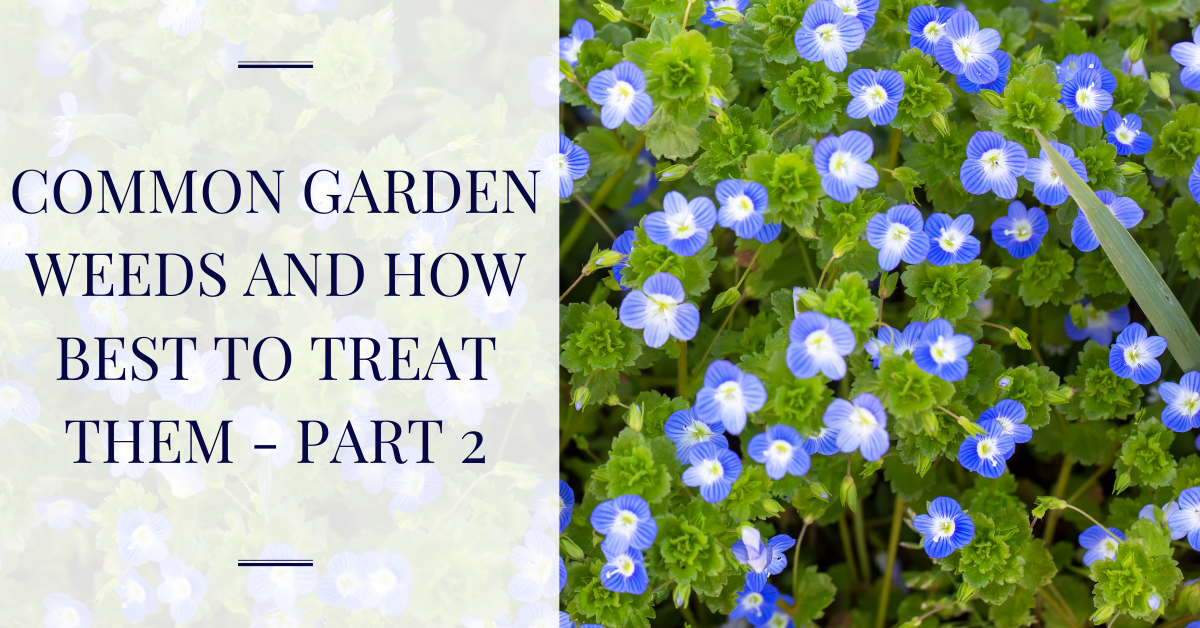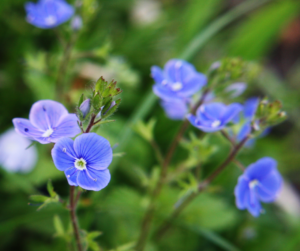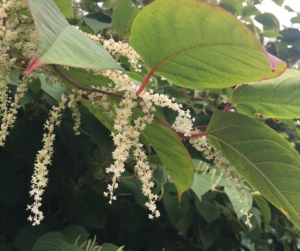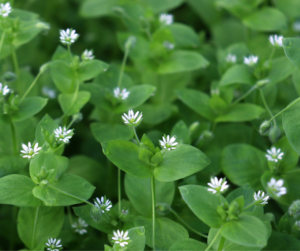
Following on from our first article in the series, Common Garden Weeds and How Best To Treat Them, and as we continue to experience slightly warmer weather, weeds will be springing up in the garden and need to be dealt with. To try and help you with this task, please see below for a description of three more common garden weeds and how best to treat them.
Speedwell
 Speedwell (also often referred to by the Latin name, Veronica) is a perennial weed that has a pretty, pale blue flower and is often kept because of how attractive it is. The plant originates from Turkey and was brought to the UK as a rockery plant during the 19th century. The weed has since naturalised and acclimatised to the UK and can now spread into lawned areas. Speedwell will grow into a dense low-level carpet, making it hard to treat. When found in borders, it should be removed and then the border will need to be hoed regularly to avoid any regrowth. If you do have a growth in your lawn, do not mow it but instead let the grass smother it. Chemicals can be used to treat this as well.
Speedwell (also often referred to by the Latin name, Veronica) is a perennial weed that has a pretty, pale blue flower and is often kept because of how attractive it is. The plant originates from Turkey and was brought to the UK as a rockery plant during the 19th century. The weed has since naturalised and acclimatised to the UK and can now spread into lawned areas. Speedwell will grow into a dense low-level carpet, making it hard to treat. When found in borders, it should be removed and then the border will need to be hoed regularly to avoid any regrowth. If you do have a growth in your lawn, do not mow it but instead let the grass smother it. Chemicals can be used to treat this as well.
Japanese knotweed
 Japanese knotweed originated from Japan and was brought to the UK in the early Victorian era. The bamboo-like stems and hardy nature of the plant meant that it was planted up in a range of gardens and along railway lines throughout the 19th and 20th centuries. Knotweed is fast-growing and can grow through a crack of any size – this can mean that the plant can grow through walls, tarmac or fencing, causing structural damage to a property. Knotweed rhizomes (roots) can grow a large distance away from the plant and need to be fully eradicated to avoid regrowth (a rhizome the size of a fingernail can cause a stand of knotweed to regrow). This extremely invasive weed should always be surveyed and treated by a specialist Japanese knotweed surveyor, due to the invasive and dangerous nature of the weed.
Japanese knotweed originated from Japan and was brought to the UK in the early Victorian era. The bamboo-like stems and hardy nature of the plant meant that it was planted up in a range of gardens and along railway lines throughout the 19th and 20th centuries. Knotweed is fast-growing and can grow through a crack of any size – this can mean that the plant can grow through walls, tarmac or fencing, causing structural damage to a property. Knotweed rhizomes (roots) can grow a large distance away from the plant and need to be fully eradicated to avoid regrowth (a rhizome the size of a fingernail can cause a stand of knotweed to regrow). This extremely invasive weed should always be surveyed and treated by a specialist Japanese knotweed surveyor, due to the invasive and dangerous nature of the weed.
Chickweed
 Chickweed is a common annual weed that grows in gardens with a rich and fertile soil. If you have Chickweed growing in your garden, it can be a sign of good soil health! Chickweed produces large amounts of quick-germinating seeds when it is in bloom – the tiny, white, five pointed flowers will bloom throughout the year, especially in spring and autumn. A single plant can produce 1,300 seeds and it can produce 5-6 generations throughout a summer season, meaning that it spreads quickly. Hand-weeding is normally an effective method of removing this plant but any herbicide containing acetic acid, fatty acid or pelargonic acid will have the desired effect.
Chickweed is a common annual weed that grows in gardens with a rich and fertile soil. If you have Chickweed growing in your garden, it can be a sign of good soil health! Chickweed produces large amounts of quick-germinating seeds when it is in bloom – the tiny, white, five pointed flowers will bloom throughout the year, especially in spring and autumn. A single plant can produce 1,300 seeds and it can produce 5-6 generations throughout a summer season, meaning that it spreads quickly. Hand-weeding is normally an effective method of removing this plant but any herbicide containing acetic acid, fatty acid or pelargonic acid will have the desired effect.
If you need any further assistance with your garden weeds, please do contact us today. If you are struggling particularly with Japanese knotweed, we advise that you get in touch with Japanese Knotweed Expert as they have decades of experience in identifying, treating, and removing knotweed!
